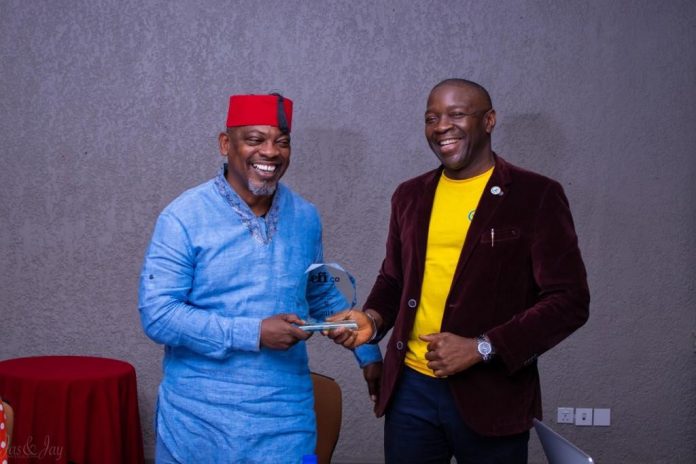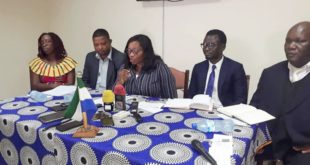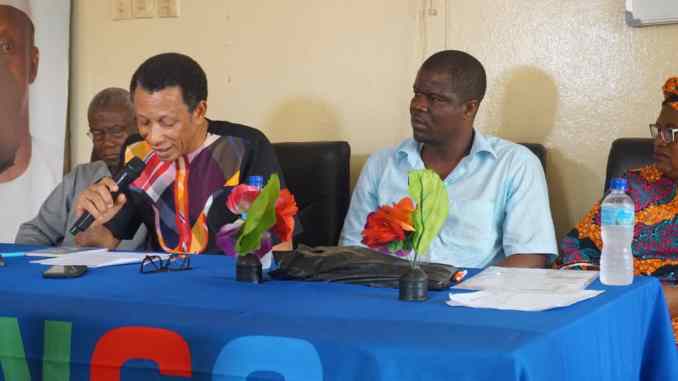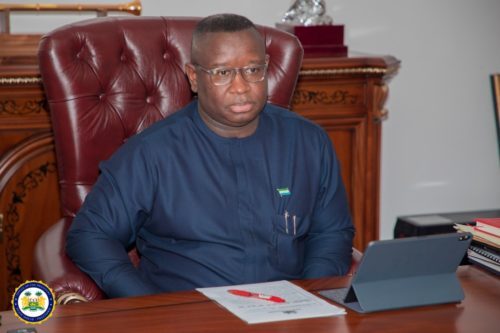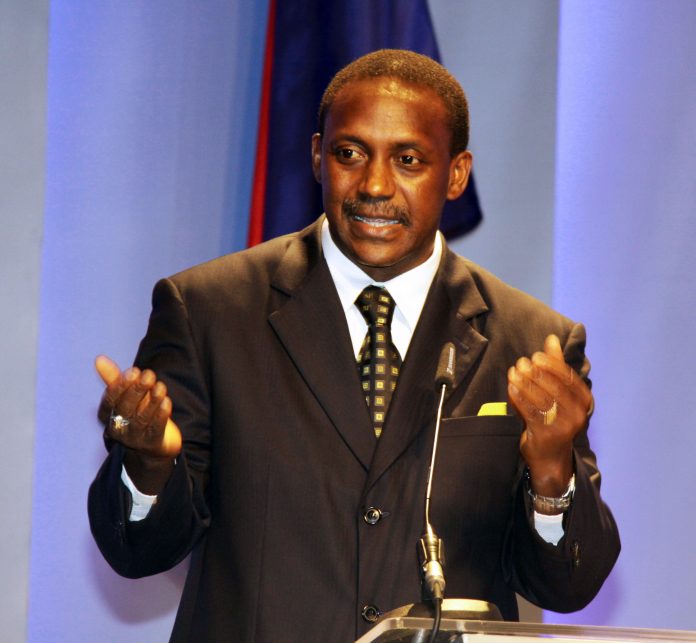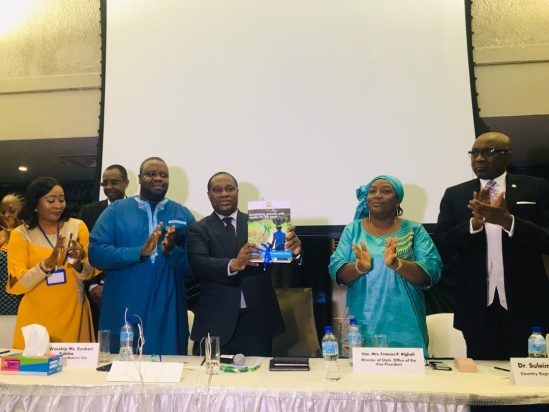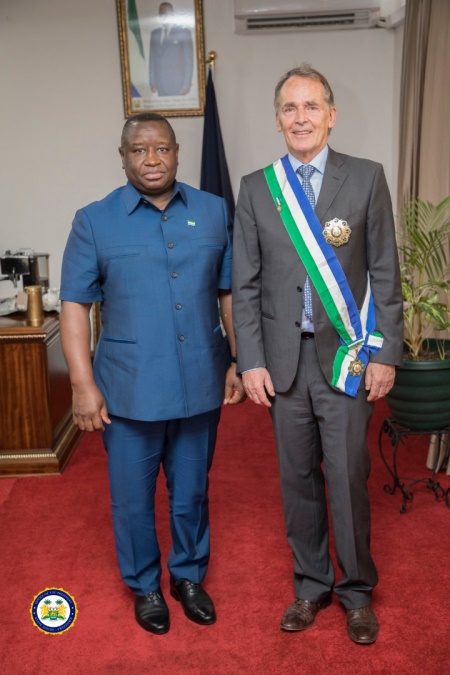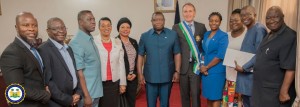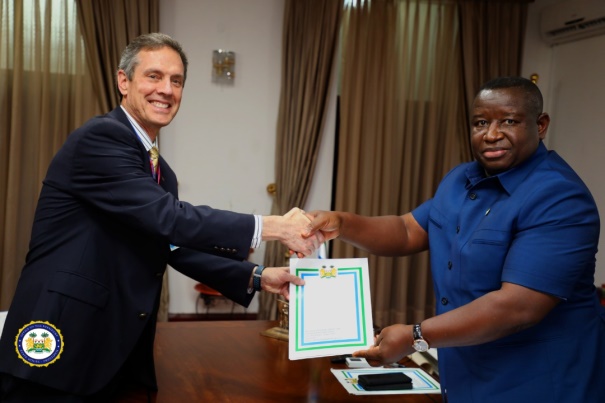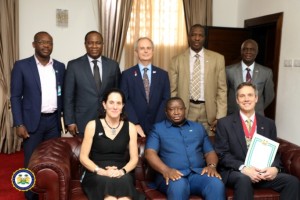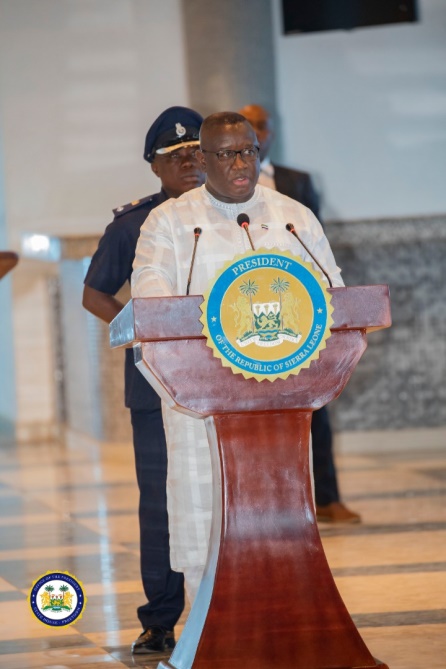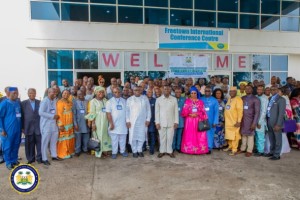By Foday Moriba Conteh
During the 3rd Press Conference held on January 23, 2020 by the opposition National Grand Coalition (NGC) party discussions bordered around the thoughts and opinions of its leadership, the 2018 Auditor General’s report into the government’s management of the country’s finances and other economic matters affecting the people of Sierra Leone.
The press briefing was led by the party’s chairman – Dr Dennis Bright. This is the statement released by the party after the briefing:
Last month, December 2019, the Auditor General presented to the Sierra Leone Parliament her report on the Accounts of Sierra Leone for the financial year ended 31st December, 2018.
This is an annual event in which, by the authority of the Constitution of Sierra Leone, the Auditor General informs the people of this country, through their representatives in Parliament, about how Government is collecting and spending their money. There are a number of reasons why this last audit report is special:
Firstly, it is the very first audit of the current SLPP Government and therefore should give the public an idea of how well the Government is managing the finances of the country (or not).
Second, when they took over power, this Government came out with very strong allegations of “egregious” corruption and financial mismanagement by the previous APC regime and promised to take decisive action to stop corruption and stop the leakages in the system. True to their word, Commissions of Enquiry were set up and the Anti- Corruption Commission (ACC) has been put on steroids with more and more authority to fight corruption.
Third, in reaction to the cries and complaints of Sierra Leoneans about the hardship that is gradually engulfing the population currently, Government has been using several media to reassure the nation that things will get better soon; that it is managing the country prudently and that we will soon begin to see the rewards for our patience.
However, bad signs relating to finance started appearing in the final sessions of Parliament last year. The Minister of Finance presented his 2020 budget to Parliament. In this budget, among other things, the Minister attempted to persuade Parliament to accept a proposal for the President, the Vice President and the Speaker to enjoy an open-ended non-accountable imprest whenever they travelled.
If this was passed, then these three personalities would have been free to travel as much as they want, spend as much of the country’s money as they want and give account to no one. Due to the public outcry this caused and resistance from some members of Parliament the President did not sign the Bill and ordered that that part be reviewed.
Thankfully, Parliament removed the free spending aspect from the bill before it was enacted. We feel that our President would have spared himself and the country all the embarrassment that this matter caused if, before the Bill reached Parliamentary stage, His Excellency had objected to it at Cabinet level.
Another bad sign was also when Parliament discovered that the Ministry of Finance had spent an amount of 13 billion Leones outside its budget without first requesting the authority to do so from Parliament as the Constitution of Sierra Leone demands. This may have been the very first time in the recent history of our democracy that an overspending of this size has been done by the Ministry of Finance, a Ministry that ought to know better.
These things, unfortunately, should have prepared us for the shock and disappointment brought by the 2018 audit results.
After the usual polite and courteous opening remarks about some “improvement in the controls over the assessment, collection and reporting of government revenue” the Auditor General reports that although revenue increased by 43% (due mainly to the introduction of the Single Treasury Account) the current Government spent in 2018 7% more than the previous APC Government spent in 2017.
Besides, the same old irregularities that previous audits uncovered during the APC years were the same types recurring under the current SLPP dispensation. Due to these irregularities which occurred in Ministries, Departments and Agencies (MDAs), Public Enterprises (PEs) such as water, energy and telecommunications agencies (but excluding Embassies and other diplomatic missions) and Local Councils (LC), the 2018 Audit report informs that Sierra Leone has lost cash amounting to a total of Le 140.9 billion Leones distributed as follows:
- MDAs 56,176,233,168
- PEs 66,298,388,310
- LCs 18,520,280,090
The Auditor General’s report of Government’s 2017 accounts does not give such a clear breakdown of losses for MDAs, PEs and LCs in that year but indicates that in 2017 the cash losses at the MDAs was Le 37 billion. Comparing the MDA losses alone for both years therefore the increase becomes clear if we convert the numbers into dollars as at the exchange rate at the time.
YEAR DOLLAR RATE CASH LOSSES CASH LOSSES
(MDAs) Le MDAs) $
2017 7543 37,000,000,000 4.9m
2018 8550 56,100,000,000 6.6m
Total Increase in cash losses 1.7m
We have only considered losses at the MDAs which have increased between 2017 and 2018 by 1.7 million dollars. This is considerably high and disappointing since this Government had sworn to block the leakages in the system. The Government may have changed but the system that is causing the suffering of citizens has not changed.
It appears as if the leakages are not only continuing but are increasing in volume. We are talking about deep-rooted, entrenched and institutional leakages that have endured and gathered strength through many Governments. There is like a template of irregularities that successive governments have been following:
- irregularities in payment of salaries,
- irregularities in payment for travels, DSAs & other allowances,
- unsupported payments & other funds not accounted for,
- unexplained expenditures, payment without approval & expenditure returns not submitted,
- imprest not retired,
- fuel not accounted for,
- revenue not banked and other revenue related issues,
- statutory deductions not paid to the relevant authorities,
- stores and fixed assets irregularities.
Additionally, there is a recurrence of blatant disregard for procurement procedures. In 2018, this is what these irregularities cost us in the Ministries, Departments and Agencies:
TYPE OF IRREGULARITY AMOUNT OF LOSSES
- Payment of salaries 4,384,950,940
- Payment for travels, DSAs & other Allowances 1,528,298,810
- Unsupported payments & other funds not accounted for 18,708,699,304
- Unexplained expenditures, payments without approval & expenditure returns not submitted 22,267,935,226
- Imprest not retired 1,113,548,001
- Fuel not accounted for 2,704,734,000
- Revenue not banked and other revenue related issues 2,414,447,492
- Statutory deductions not paid to the relevant authorities 2,946,619,395
- Stores and fixed assets irregularities 107,000,00
TOTAL 56,176,233,168
It is indeed alarming that within a system that has been here since 1961 and in spite of all the auditors’ recommendations made every year on what to do to correct anomalies in the use of public funds, successive Governments are still making unexplained expenditures, unsupported payments, not retiring imprest and not accounting for fuel.
It is our view that irregularities for such basic things are not mistakes but are done deliberately to confuse and escape. When expenditure is reported without any supporting documents given there is no way one can tell if this is just pure negligence or incompetence or how much money was actually stolen. The whole idea of spending and not showing proof of how public money was used is a clever way of hiding away unlawful expenditure.
The only way to fight against this is to take decisive action not only against those directly responsible for these losses but also their managers and supervisors. However, officials know that after the Audit reports there will be some noise for a few weeks, nobody will be penalized and business will continue as usual.
The Auditor General has indicated what she considers to be the root causes of poor audit outcomes. She mentions “Slow response by authorities to Auditor’s recommendations on internal controls…”, “lack of consequences for poor performance and transgressions in general governance…,” “weaknesses in performance management, which include a lack of credible and effective performance management systems across MDAs” and “Lack of adequate monitoring.”
In the 2017 report, she lamented that the Auditor General’s “observations and recommendations are still not being given the level of attention they deserve. Parliament, citizens and international donors have a right to know about the utilization of resources”. In the 2018 report, she states that “Follow-up on audit recommendations is crucial if value is to be added on the activities of government”.
We observe that the ACC has opened investigations into the 2018 audit results already. It is also incumbent upon the office of the Chief Minister and the Public Accounts Committee of Parliament to work seriously not only on tracking the implementation of the Auditor’s recommendations but also on establishing a robust monitoring system that works.
If this Government is serious to put an end to corruption they will institute thorough non-partisan investigations to determine those who bear responsibility for these irregularities and penalize them. Now that we are seeing Ministers indicted it will be more reassuring for Government to show that there are no special ones that cannot be touched.
This brings us to the ongoing Chinese rice saga.
First of all, it is the duty of Government to come up with policies, strategies and programmes to feed its people. For us to be in a position where the government of China should be sending rice to the Government of Sierra Leone to feed our children is a big shame indeed. But what has been happening to this donated rice is doubly shameful; at least two Ministers have been indicted so far for stealing rice meant for the children. We believe that there are many more top personalities involved.
And this is going to be a litmus test for the Anti-Corruption Commission. We are watching closely to see how the ACC is handling this case. We know that when donations of this magnitude are made by a foreign Government there are certain institutions that are definitely in the know or involved somehow. These are the Ministry of Foreign Affairs and International Cooperation, State House, and in this case the Ministry of Agriculture and the Ministry of Education.
Now that we see that some of the rice found their way into the hands of Resident Ministers, Ministers’ associates and Members of Parliament, we demand that the public be informed about the following:
- a) What was the distribution plan used for the disposal of the 50,000 bags of rice?
- b) Was it a decision of the Government to reserve some quantity of the children’s rice for politicians?
- c) If the rice was supposed to be distributed by NGOs, how did Ministers and Members of Parliament manage to get their hands on it?
- d) Are the Ministers named so far (in the Ministry of Basic and Senior Secondary Education, and the Resident Ministry, North West) the only top Government personalities that touched the children’s rice? Or is there a selective approach that protects some sacred cows?
We cannot wait to hear the answers that the ACC or the Ministry of Information will be giving to these questions. We in the NGC are convinced that there is more to this Chinese rice story than we have been told. With all this going on it will be important for the ACC to find out and inform the nation also on how the text books and other free school materials were distributed and by whom.
We are hoping that Government will not treat this matter in the same carefree way in which Audit recommendations have been treated in the past. The Government promised Free Quality education for our children not free-for-all chap-chap for the top guns. The ACC must be thorough in their investigations and there should be no sacred cows. Joseph Ben Keifala has been working hard but in this case it is his integrity and reputation that are on the line.
More importantly, the Chinese Children’s rice raises a lot of questions about Government’s flagship program. How is it faring? What are the chances of this program succeeding if even Ministers and top Civil servants who are supposed to be supervising its implementation are freely helping themselves to the things that are meant for the children?
Sadly, this rice episode brings back memories of the cobweb of fraud and dark mysterious dealings that enveloped the Ebola funds during the APC regime; except that at least now some attempt is being made to investigate. But it is almost as if every Government now has their thieving emblem: APC Ebola or SLPP Chinese rice. So we are asking the question: after the rice, what next? Text books? School furniture?
The Auditor General was on national radio a couple of days ago saying that they could find no signs of delivery of school supplies intended for distribution to schools under the Free Quality Education program. And by the way, where are the school buses that were also meant for the children?
The people of Sierra Leone need to be informed! Government is spending so much money on a strategic communications outfit, basically a team of propagandists that step in every time there is a very serious issue in the country to defend the Government with the same boring tunes such as “This is what we inherited” or their latest hit entitled: “It’s a process.”
We demand that Government comes out with the whole truth this time and without any delay because the people of Sierra Leone have the right to know it. Already, because this is a small country far too many people have seen, heard and understood things; they are just waiting to see what this Government will do. On this issue of Chinese children’s rice, the ACC, the Justice system and by extension the Government are on trial in the people’s court.
Finally, we want to do two things: first, to thank the Auditor General for the selfless, fearless, honest and professional way she has been doing her work never mind who is in power. In a country where we are still struggling to recognize the fact that women, if given the opportunity, can play a critical role in governance, we are so heartened by the exceptional character and demonstrated abilities of Lara Taylor-Pearce. May God guide her and give her the strength, will and space to continue to work for her people.
Secondly we wish to refer to His Excellency the President’s New Year’s Message in which he stated: “We continue to open up civic spaces and we encourage our citizens to speak up and make our democracy stronger and better.” We are assuming of course that this encouragement is extended also to political parties in opposition.
In this regard we expect the main opposition parties especially the APC and C4C to be doing what the NGC is doing right now, that is, critically examining the performance of Government and using all the platforms that they have, especially their strength in Parliament, to hold the Government accountable.
We at the NGC know that as an opposition party we can only gain strength by constantly speaking up for the common man, and not by fighting among ourselves. Opposition parties have a duty to defend the bread and butter interests and concerns of the people not tear themselves apart in political wars that will only benefit themselves. We therefore promise that we will continue to keep to our promise of seeking only the good of our people and of putting, after God/Allah, OUR COUNTRY FIRST.
And it is on that note that we the members of the NGC would like to wish our growing numbers of supporters, well-wishers and the entire nation a blessed New Year full of hope and the mercies of God/Allah.
To our colleagues of the Fourth Estate we commit ourselves to continue working with you with honesty and steadfastness for the good of our nation. Thank you and see you next month.

